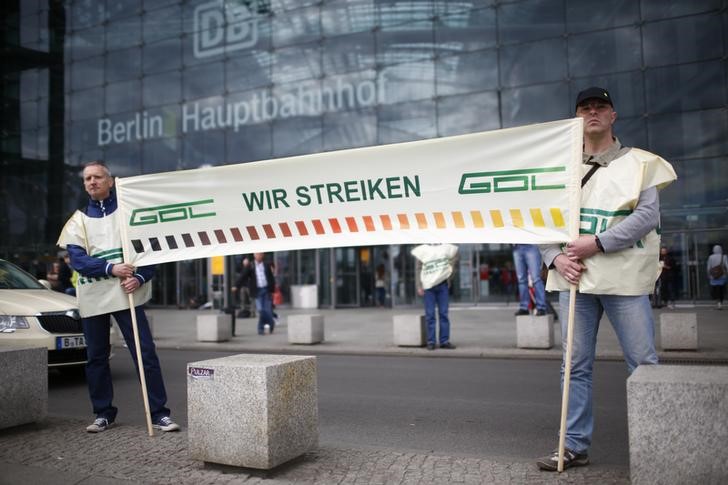By Stephen Brown
BERLIN (Reuters) - German train drivers announced on Monday their ninth strike in an ongoing dispute with rail operator Deutsche Bahn, which will bring freight trains to a standstill from Tuesday and passenger trains on Wednesday - with no date given for the strike to end.
The GDL union said it will announce the end of the strike with 48 hours' notice, raising the prospect of even longer disruption than a seven-day strike earlier this month, which was already the longest in the history of Deutsche Bahn [DBN.UL].
"Strikes hurt everyone and cost time and money," said Ulrich Weber, Deutsche Bahn's personnel chief, adding that the union had rejected all offers before talks broke down this weekend.
The dispute over pay, working conditions and the power of the union itself has caused major disruption in a country where about 5.5 million people travel by train every day and one-fifth of freight - 620,000 tonnes a day - is hauled by rail.
Economists estimate that the last strike could have clipped 0.1 percentage points off German economic growth in the second quarter of the year, costing Europe's biggest economy up to 750 million euros in lost activity.
The latest freight-train strike will begin on Tuesday at 3 p.m. (1300 GMT) and the passenger-train strike early on Wednesday at 2 a.m. (0000 GMT), GDL leader Claus Weselsky told reporters.
"You can assume this strike will be somewhat longer than the last one," said Weselsky. As well as a 5 percent pay rise and a shorter working week, he wants the GDL - which represents about 20,000 German train drivers - to be able to negotiate on behalf of other workers in the company, such as train stewards.
This has prompted a rare intervention in a labour dispute from Chancellor Angela Merkel, who urged the conflicting parties to avoid creating "a serious burden" for people and companies.
In a country largely unaccustomed to disruptive union action until a spate of train and airline strikes last year, the German government is scrambling to reverse changes in the law that now permit smaller unions like the GDL to bring entire businesses - and industries that rely on them - to a standstill.

One union source said the strike action would likely impact the upcoming May 23-25 holiday weekend in Germany.